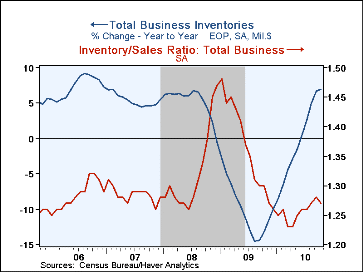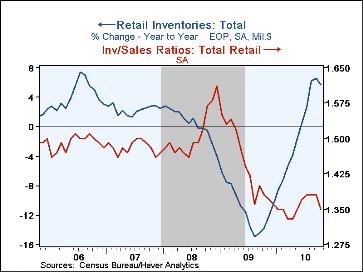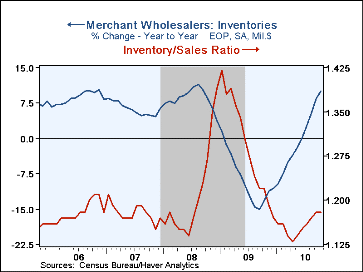 Global| Dec 14 2010
Global| Dec 14 2010U.S. Business Inventory Accumulation Remains Strong
by:Tom Moeller
|in:Economy in Brief
Summary
Businesses want more inventories lining the shelves. A 0.7% increase in inventories during October eased after an upwardly revised 1.3% September gain. However, the 6.9% y/y increase was nearly the strongest since late-2006. Inventory [...]
 Businesses want more inventories lining the shelves. A 0.7% increase in
inventories during October eased after an upwardly revised 1.3% September gain.
However, the 6.9% y/y increase was nearly the strongest since late-2006.
Inventory accumulation certainly was voluntary since it accompanied a 1.4%
increase (9.3% y/y) in business sales. Despite all the inventory accumulation,
the inventory-to-sales ratio at 1.27 roughly approximated its trend level before
the recession began. That represents a significant correction after the unwanted
surge during the economic downturn.
Businesses want more inventories lining the shelves. A 0.7% increase in
inventories during October eased after an upwardly revised 1.3% September gain.
However, the 6.9% y/y increase was nearly the strongest since late-2006.
Inventory accumulation certainly was voluntary since it accompanied a 1.4%
increase (9.3% y/y) in business sales. Despite all the inventory accumulation,
the inventory-to-sales ratio at 1.27 roughly approximated its trend level before
the recession began. That represents a significant correction after the unwanted
surge during the economic downturn.
The picture of quicker inventory accumulation is not, however, broad-based. Retail inventories in fact fell 0.6% led by a 1.3% drop (+15.4% y/y) in motor vehicles. Less autos inventories slipped 0.3% and have risen just a moderate 2.2% from last year. A 0.2% increase (1.0% y/y) in apparel was offset by a 0.8% decline in furniture (+1.3% y/y) and a 0.1% dip in general merchandise (3.6% y/y).
In the wholesale sector the picture of accelerated inventory is distorted, but not by much, by the rise in oil prices. Overall, inventories surged 1.9% during October and by 9.9% from last year. However, petroleum inventories surged 3.5% (26.2% y/y) with higher prices. Less petroleum, wholesale inventories rose 1.8% during October and by 9.2% y/y.
In the factory sector, inventories jumped another 0.9% (5.8% y/y) following the 8.8% decumulation during 2009.
The business sales and inventory data are available in Haver's USECON database. Note that in a value-added feature, the database includes series calculated by Haver database managers showing sales, inventories and I/S ratios for total business less motor vehicle dealers and related wholesale operations.
| Business Inventories (%) | Oct | Sept | Aug | Year Ago | 2009 | 2008 | 2007 |
|---|---|---|---|---|---|---|---|
| Total | 0.7 | 1.3 | 0.9 | 6.9 | -9.8 | 0.8 | 4.0 |
| Retail | -0.6 | 0.8 | 1.1 | 5.7 | -10.4 | -3.3 | 2.5 |
| Retail ex Motor Vehicles | -0.3 | 0.4 | 0.4 | 2.2 | -4.9 | -1.9 | 2.7 |
| Wholesale | 1.9 | 2.1 | 1.2 | 9.9 | -10.5 | 3.7 | 6.4 |
| Manufacturing | 0.9 | 1.1 | 0.4 | 5.8 | -8.8 | -0.8 | 7.6 |
Tom Moeller
AuthorMore in Author Profile »Prior to joining Haver Analytics in 2000, Mr. Moeller worked as the Economist at Chancellor Capital Management from 1985 to 1999. There, he developed comprehensive economic forecasts and interpreted economic data for equity and fixed income portfolio managers. Also at Chancellor, Mr. Moeller worked as an equity analyst and was responsible for researching and rating companies in the economically sensitive automobile and housing industries for investment in Chancellor’s equity portfolio. Prior to joining Chancellor, Mr. Moeller was an Economist at Citibank from 1979 to 1984. He also analyzed pricing behavior in the metals industry for the Council on Wage and Price Stability in Washington, D.C. In 1999, Mr. Moeller received the award for most accurate forecast from the Forecasters' Club of New York. From 1990 to 1992 he was President of the New York Association for Business Economists. Mr. Moeller earned an M.B.A. in Finance from Fordham University, where he graduated in 1987. He holds a Bachelor of Arts in Economics from George Washington University.
More Economy in Brief
 Global| Feb 05 2026
Global| Feb 05 2026Charts of the Week: Balanced Policy, Resilient Data and AI Narratives
by:Andrew Cates








